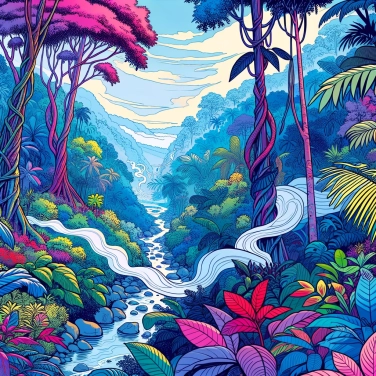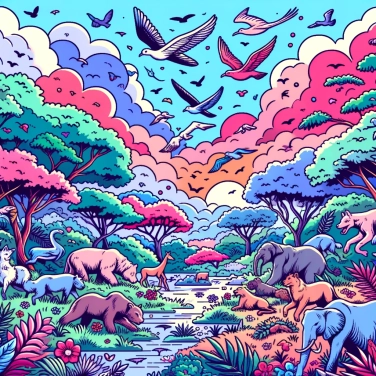Tropical forests are called the 'lungs of the Earth' because they absorb carbon dioxide from the atmosphere and produce around 20% of the oxygen on our planet, helping to regulate the climate and maintain the oxygen balance.

Tropical forests play a crucial role in the production of oxygen through a simple phenomenon: photosynthesis. During this process, plants absorb sunlight, take in carbon dioxide (CO2) from the air, and release oxygen in exchange. It is mainly thanks to their billions of trees and other lush plants that tropical forests generate about 20% of the oxygen on Earth each year. Therefore, it is not insignificant when we take a deep breath of fresh air! Without them, the air would simply be much less pleasant to inhale.
Tropical forests play a key role in absorbing carbon dioxide (CO₂) from the atmosphere. Through photosynthesis, these trees capture CO₂ to transform it into organic matter and store it in their leaves, branches, trunks, and roots. When you look at a towering tree in the Amazon, imagine that it is trapping tons of carbon, preventing it from accumulating as a greenhouse gas in the air. This phenomenon helps reduce our carbon footprint by slowing down climate change. That’s why preserving these forests is akin to protecting one of our greatest allies against global warming.
Tropical forests play a central role in our climate by acting as giant natural air conditioners. Through their dense vegetation cover, they create moisture through evaporation and thus cool the air around them. This regulation limits extreme temperature variations and even helps influence global atmospheric currents. Essentially, they help our planet avoid a global heatwave by regulating air circulation and the movement of cloud masses over vast distances. Without these immense wooded areas, we would quickly lose the delicate balance that regulates our global climate.
Tropical forests are home to more than half of the living species on Earth, a true paradise for animals, plants, fungi, and insects of all kinds. These warm, humid, and dense environments provide unique habitats where rare, sometimes unknown, species thrive quietly. Exciting, isn't it? Every year, thousands of new species are discovered in these forests. The richness of biodiversity also allows for vital interactions, such as pollination and seed dispersal, which ensure the survival of ecosystems. Without these forests, many species could simply disappear.
Thanks to dense and abundant vegetation, tropical forests capture significant amounts of water through their roots and leaves. These trees literally transpire, releasing water vapor into the atmosphere: this is called evapotranspiration. This phenomenon generates clouds, which sometimes travel very far, providing entire regions with rain, even hundreds of kilometers away. In other words, without tropical forests, some areas would quickly become dry, turning their landscape into a desert climate. To put it more clearly: these forests are somewhat like a large natural water pump that redistributes moisture over a large part of the planet.
The soils of tropical forests are surprisingly poor in nutrients. Trees and plants survive thanks to a rapid biological cycle and an extremely fast decomposition of organic matter.
Tropical forest trees not only release oxygen but also produce up to 20 billion tons of moisture per day, directly influencing global weather.
Some plants from tropical forests are used in the composition of medications that we commonly use. Nearly a quarter of modern medicines originate from tropical plants.
Every minute, the equivalent of 30 football fields of tropical forests disappears due to deforestation. This phenomenon poses a serious threat to our environment and the global climate.
Among the emblematic examples, we can mention the orangutan, which lives solely in the tropical forests of Asia, the jaguar, found exclusively in the forested regions of Central and South America, and the okapi, a rare species endemic to the Congolese forests of Central Africa. These are symbols of the exceptional yet fragile biodiversity present in these regions.
The destruction of tropical forests releases significant amounts of carbon stored in trees and soils into the atmosphere, thereby enhancing the greenhouse effect. It also reduces the natural capacity of these ecosystems to absorb and sequester CO2, gradually amplifying the effects of global climate change.
Tropical forests play a significant role in regulating the water cycle by promoting evapotranspiration, a process during which plants release moisture into the atmosphere in the form of water vapor. This phenomenon helps regulate precipitation, atmospheric circulation, and regional patterns, while stabilizing local and global water regimes.
Tropical forests indeed play a significant role in oxygen production due to their continuous plant growth throughout the year. However, a large number of terrestrial and aquatic ecosystems, particularly the oceans and their phytoplankton, collectively contribute to the majority of this oxygen production.
The main threats include deforestation for agricultural purposes or timber exploitation, intensive extraction of natural resources, intentional or unintentional fires, and climate disruptions themselves that weaken the resilience of these highly diverse ecosystems.
Everyone can take concrete action: by prioritizing products from responsible sources (such as FSC-certified products), by limiting the consumption of agricultural products that contribute to deforestation (like palm oil or soy from deforested areas), by supporting organizations involved in conservation, and by raising awareness among their circle about these environmental issues.

No one has answered this quiz yet, be the first!' :-)
Question 1/6